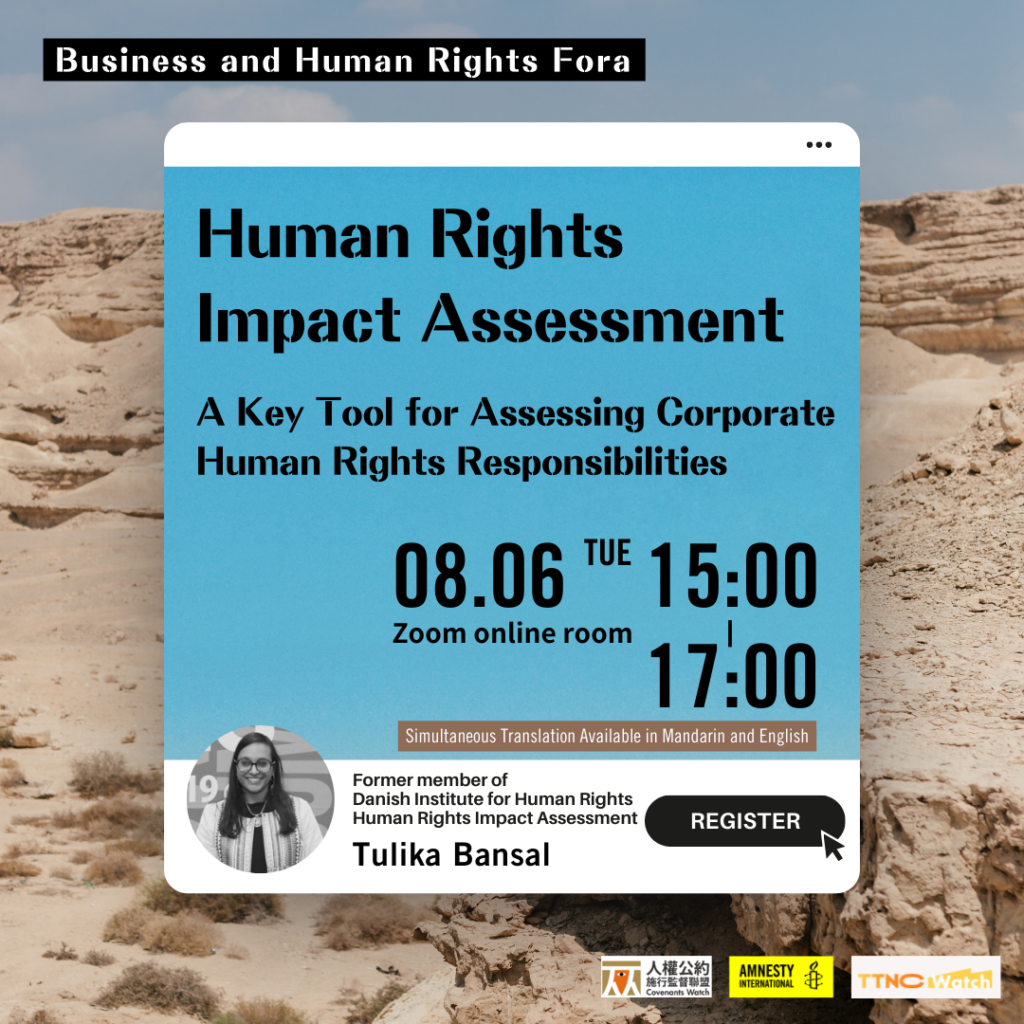Business and Human Rights Fora III: Human Rights Impact Assessment– A Key Tool for Assessing Corporate Human Rights Responsibilities
Time: August 6, 2024 (Tuesday) 15:00-17:00 Taipei time
Location: online meeting (zoom)
Speakers:
- Tulika Bansal|Former member of Human Rights Impact Assessment team, Danish Institute for Human Rights (DIHR)
Host:
- Song-Lih Huang|Director, Policy Center, Covenants Watch
Registration: https://forms.gle/XU8c9VSkUWv9KbKj7 (Registration is open until August 5th 12 p.m. or until the quota is full)
Language: Primarily English, with simultaneous interpretation in Chinese
—Organizers—
- Covenants Watch
- Amnesty International Taiwan
- Taiwan Transnational Corporations Watch (TTNC Watch)
Significant developments have emerged in global governance frameworks for regulating corporate behaviors. These include the adoption of the United Nations Guiding Principles on Business and Human Rights (UNGPs) in 2011, the revision of the OECD’s Guidelines for Multinational Enterprises (MNE Guidelines) and Due Diligence Guidance for Responsible Business Conduct, the issuance of the EU’s “Corporate Sustainability Due Diligence Directive” in 2024, ongoing negotiations surrounding a UN binding treaty on Business and Human Rights (BHR), and the enactment of national legislation by numerous countries addressing human rights and environmental standards. Consequently, enterprises are increasingly confronted with heightened expectations pertaining to governance excellence, the responsibility of respecting human rights, and the imperative to eliminate or mitigate adverse impacts on both society and the environment.
- For enterprises: Implementing appropriate Human Rights Impact Assessments (HRIA) as a fundamental approach to systematically identify, prevent and mitigate adverse impacts of their operations on human rights.
- For governments: Effective regulations and guidelines to ensure companies conduct HRIA.
- For civil society: Evaluating the effectiveness of enterprises’ HRIA in addressing potential human rights impacts and using HRIA findings to monitor and hold enterprises accountable for their human rights responsibilities.
In this lecture, we invite Ms. Tulika Bansal from the HRIA team of the Danish Institute for Human Rights (DIHR) to introduce HRIA in detail, and explain how HRIA can effectively assist companies in fulfilling their human rights responsibility through case analysis. Ms. Tulika Bansal has extensive practical experience in impact assessment, and is committed to integrating such assessment with environmental, social, health, land, indigenous people, biodiversity and gender knowledge. She will provide valuable insights on how to better understand and apply HRIA.


-1024x1024.jpg)
-1024x1024.png)